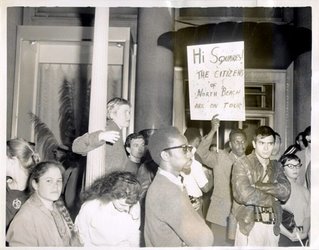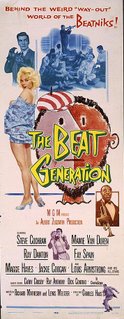
Lawrence Ferlinghetti, See It Was Like This When...
Jack Kerouac, Zoot Sims and Al Cohn, American Haikus (excerpt).
In April 1958, the San Francisco newspaper columnist Herb Caen coined the word "beatnik," a play on "Sputnik," tossing the neologism into an otherwise run-of-the mill gossip piece which, thanks to the grace of time, is at least 75% incomprehensible. (It warms the heart to think that someone in 2050 will be baffled by any reference to "Federline.")
The appearance of "beatnik," a word detested by Allen Ginsberg and Jack Kerouac, who rightly saw they were being turned into cartoons, was the death knell of the whole Beat movement (the following year would see the ludicrous movie The Beat Generation--producer Albert Zugsmith even copyrighted the title--and the introduction of Maynard G. Krebs). The Beats were profiled relentlessly in Life and Look and Time, while the most notable Beats, like Kerouac, were appearing on television and releasing LPs. Mainstream culture, for a moment, was fascinated by the Beats, perhaps considering them court jesters for the atomic age. It was all a dry run for the far greater obsession/revulsion that marked the media's encounters with the counterculture of the following decade.
Still, the finest works of the waning Beat era retain their life, in part because the Beats would come up with bewildering, sharp-edged images, as in Kerouac's "American Haikus," or, simply, because they're funny. I've written about how Allen Ginsberg's "America" is more stand-up routine then portentous declamation. And here's the poet Lawrence Ferlinghetti, with a miniature adventure called "See It Was Like This When...," which is a segment of A Coney Island of the Mind. The folk group Aztec Two-Step took their name from it.
This recording was made some time later, at the Writer's Center in Bethesda, Maryland. On In Their Own Voices.

Jack Kerouac's "American" haikus don't follow the classic haiku five syllable-seven syllable-five syllable format. Kerouac thought the syllabic restrictions only worked in the Japanese language--he was interested instead in attempting to capture, in as few words as possible, some tiny fragment of experience.
In a recording of some of the haikus, though, Al Cohn and Zoot Sims, on dueling saxophones, steal the show, often trumping Kerouac's image with an inspired phrase. There's the dancing string of notes after "cats step slowly," the machine-gun burst after "aging young couples," the jaunty swagger after the line about young girls running up the library steps, and more.
Kerouac's haikus are collected in Book of Haikus. And this recording (which is about ten minutes in its entirety) was made in New York in 1958 and released on the LP Blues and Haikus a year later. Find on the Kerouac Collection.
No comments:
Post a Comment